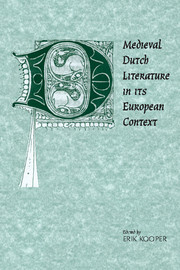Book contents
- Frontmatter
- Contents
- List of contributors
- Preface
- Map
- Introduction
- PART I COURT AND CITY
- PART II THE WORLD OF CHIVALRY
- PART III REYNARD THE FOX
- PART IV THE LITERATURE OF LOVE
- PART V RELIGIOUS LITERATURE
- 11 The saint and the world: the Middle Dutch Voyage of Saint Brendan
- 12 Hadewijch: mystic poetry and courtly love
- 13 The Modern Devotion and innovation in Middle Dutch literature
- PART VI ARTES TEXTS
- PART VII DRAMA
- Appendix A Bibliography of translations
- Appendix B Chronological table
- Index
12 - Hadewijch: mystic poetry and courtly love
Published online by Cambridge University Press: 13 October 2009
- Frontmatter
- Contents
- List of contributors
- Preface
- Map
- Introduction
- PART I COURT AND CITY
- PART II THE WORLD OF CHIVALRY
- PART III REYNARD THE FOX
- PART IV THE LITERATURE OF LOVE
- PART V RELIGIOUS LITERATURE
- 11 The saint and the world: the Middle Dutch Voyage of Saint Brendan
- 12 Hadewijch: mystic poetry and courtly love
- 13 The Modern Devotion and innovation in Middle Dutch literature
- PART VI ARTES TEXTS
- PART VII DRAMA
- Appendix A Bibliography of translations
- Appendix B Chronological table
- Index
Summary
Three fourteenth-century manuscripts in the Brabantine language have preserved a most remarkable collection of religious texts from about the middle of the thirteenth century, to be ascribed to a woman mystic by the name of Hadewijch. The corpus consists of fourteen Visions, thirty-one Letters addressed to friends or followers, sixteen Didactic Poems, mostly in rhyming couplets, and forty-five highly sophisticated Poems in Stanzas. The Poems in Stanzas in particular have presented quite a problem to literary historians. When the German scholar F. J. Mone, the first to have rediscovered Hadewijch's writings after four centuries of almost complete oblivion, mentioned these poems in his Survey of the ancient literature of the Low Countries (1838), he rightly observed that the love which they pay tribute to is ‘spiritualized towards the divine’, but at the same time he still classified them as weltliche Minnelieder, ‘worldly love-songs’, along with, for instance, the songs of Duke John I of Brabant. This uncertainty is quite understandable: it has in fact remained characteristic of Hadewijch studies up to the present day. Hadewijch's Poems in Stanzas indeed bear such a striking resemblance to the worldly love-poetry of their time that one must really look very closely to perceive a difference, if there is any.
- Type
- Chapter
- Information
- Medieval Dutch Literature in its European Context , pp. 208 - 225Publisher: Cambridge University PressPrint publication year: 1994
- 2
- Cited by



